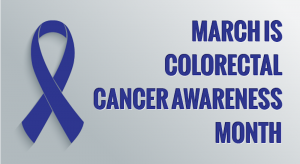
President Bill Clinton designated March as Colorectal Cancer Awareness Month in the year 2000. Since then, gastroenterologists and their associates have been spreading the word about colorectal cancer every March with public awareness events, such as fun runs, dress in blue day, and giant walk-through colons.
In honor of that, here are eight things you can do to help prevent colon cancer.
- Eat your fiber.
A recent study found that over ten percent of cases of colon cancer were linked to low fiber diets. Foods high in fiber include whole grain breads, beans, nuts, lentils, vegetables, and fruits. While the best way to get the fiber you need is with foods, an easy way to incorporate more fiber in your diet is a daily fiber supplement. These are available over the counter in a variety of formulations (powders, wafers, even gummies!) to fit your taste and lifestyle.
- Limit your alcohol intake.
The American Cancer Society has found that too much alcohol is associated with a higher risk of colorectal cancer, as well as other types of cancer. The link is strongest is men, but it affects women, too. The American Cancer Society recommends consumption of no more than 2 drinks daily for men and no more than 1 drink daily for women.
- Talk to your doctor about starting a baby aspirin daily.
The United States Preventive Services Task Force has found that taking a baby aspirin daily can help prevent development of colorectal cancer (and cardiovascular disease, too) for some people. Of course, before beginning any medication, including over the counter medications, you should talk to your doctor to make sure it’s safe for you.
- Maintain a healthy weight.
Obesity has been linked to many health problems, and colon cancer is no exception. While we aren’t sure exactly what it is about obesity that increases the risk of developing colorectal cancer, obtaining and maintaining a healthy weight remain an important part of preventing it.
- Know your family history.
Colon cancer can be an embarrassing topic for many people. However, it’s important to know your family history so your risk for the disease can be properly evaluated. And if you are diagnosed with colon cancer, please share that with your family members so they can be screened, too.
- Get screened for colon cancer.
Talk to your doctor about getting screened for colon cancer. The current recommendation is that everyone who is average risk (no symptoms, no family history of colon cancer) get screened at age 50. Some guidelines suggest that African-Americans should be screened beginning at age 45. Early stage colon cancer is often asymptomatic, meaning you feel perfectly healthy. Conversely, by the time symptoms of colon cancer appear, the disease is often more serious and may have spread to other areas of your body. That is why screening is so important. Screening allows us to find early cancerous lesions or precancerous lesions before they become a cancer.
- Be aware of your body.
Check out your stool in the toilet before you flush. Sounds gross, doesn’t it? But the stool is a great indicator of your entire gastrointestinal system’s health. Your stools should be soft but not watery, easy to pass, and brownish in color. Stools with blood in them, stools that are black, or stools that are clay colored could indicate a problem with your gastrointestinal system that you should bring to your doctor’s attention.
- And one more thing…
Some studies indicate that smoking is associated with the development of colon cancer. Quitting smoking has a myriad of health benefits, including better breathing, decreased risk of lung cancer, and decreased risk of heart attack or stroke. We can add decreasing risk for colon cancer to that list. One more good reason to put out the cigarette.
Colon cancer is the third most common cancer in the United States, but it doesn’t have to be. We encourage you to get screened. Screening is the single most important thing you can do to prevent colon cancer.

Share This